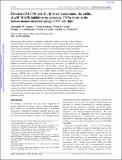Elevated GM-CSF and IL-1beta levels compromise the ability of p38 MAPK inhibitors to modulate TNFalpha levels in the human monocytic/macrophage U937 cell line
Author(s)
Espelin, Christopher W.; Goldsipe, Arthur C.; Sorger, Peter K.; Lauffenburger, Douglas A.; de Graaf, David; Hendriks, Bart S.; ... Show more Show less
DownloadEspelin MBS 2010.pdf (2.748Mb)
PUBLISHER_POLICY
Publisher Policy
Article is made available in accordance with the publisher's policy and may be subject to US copyright law. Please refer to the publisher's site for terms of use.
Alternative title
Elevated GM-CSF and IL-1β levels compromise the ability of p38 MAPK inhibitors to modulate TNFα levels in the human monocytic/macrophage U937 cell line
Terms of use
Metadata
Show full item recordAbstract
Rheumatoid arthritis (RA) is a complex, multicellular disease involving a delicate balance between both pro- and anti-inflammatory cytokines which ultimately determines the disease phenotype. The simultaneous presence of multiple signaling molecules, and more specifically their relative levels, potentially influences the efficacy of directed therapies. Using the human U937 monocytic cell line, we generated a self-consistent dataset measuring 50 cytokines and 23 phosphoproteins in the presence of 6 small molecule inhibitors under 15 stimulatory conditions throughout a 24 hour time course. From this dataset, we are able to explore phosphoprotein and cytokine relationships, as well as evaluate the significance of cellular context on the ability of small molecule inhibitors to block inflammatory processes. We show that the ability of a p38 inhibitor to attenuate TNFα production is influenced by local levels of GM-CSF and IL-1β, two cytokines known to be elevated in the joints of RA patients. Within the cell, compensatory mechanisms between signaling pathways are apparent, as selective p38 MAPK inhibition results in the increased phosphorylation of other MAPKs (ERK and JNK) and their downstream substrates (CREB, c-Jun, and ATF-2). Further, we demonstrate that TNFα-neutralizing antibodies have secondary effects on cytokine production, impacting more than just TNFα alone. p38 MAPK inhibition using a small molecule inhibitor also blocks production of anti-inflammatory cytokines including IL-10, IL-1ra and IL-2ra. Collectively, the impact of cell context on TNFα production and unintended blockade of anti-inflammatory cytokines may compromise the efficacy of p38 inhibitors in a clinical setting. The effort described in this work evaluates the effect of inhibitors on multiple endpoints (both intra- and extracellular), under a range of biologically relevant conditions, thus providing a unique means for differentiation of compounds and potential opportunity for improved pharmacological manipulation of disease endpoints in RA.
Date issued
2010-07Department
Massachusetts Institute of Technology. Department of Biological EngineeringJournal
Molecular BioSystems
Publisher
Royal Society of Chemistry
Citation
Espelin, Christopher W. et al. “Elevated GM-CSF and IL-1β Levels Compromise the Ability of P38 MAPK Inhibitors to Modulate TNFα Levels in the Human Monocytic/macrophage U937 Cell Line.” Molecular BioSystems 6.10 (2010): 1956. Copyright The Royal Society of Chemistry 2010.
Version: Final published version
ISSN
1742-206X
1742-2051